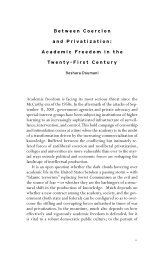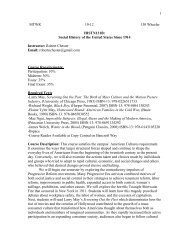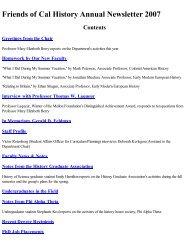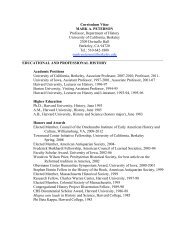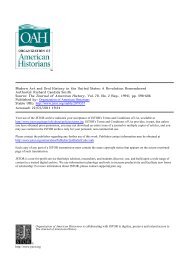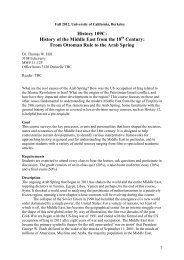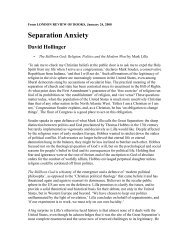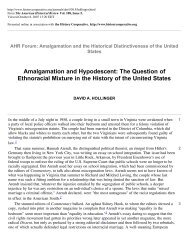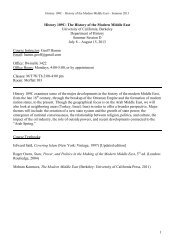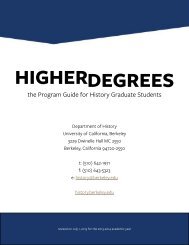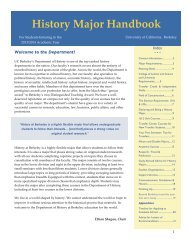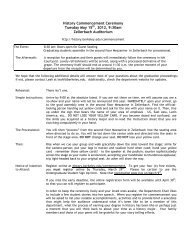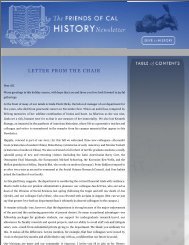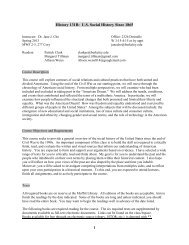My Grandmother and Other Stories: Histories of the Palestinians as ...
My Grandmother and Other Stories: Histories of the Palestinians as ...
My Grandmother and Other Stories: Histories of the Palestinians as ...
You also want an ePaper? Increase the reach of your titles
YUMPU automatically turns print PDFs into web optimized ePapers that Google loves.
The Great War brought about a<br />
radical break with <strong>the</strong> Ottoman p<strong>as</strong>t<br />
in <strong>the</strong> whole Arab E<strong>as</strong>t, not only<br />
in <strong>the</strong> established constitutional<br />
regime, but also in <strong>the</strong> system <strong>of</strong><br />
governance, local administration,<br />
<strong>and</strong> identity politics. 1915 w<strong>as</strong> <strong>the</strong><br />
Year <strong>of</strong> <strong>the</strong> Locust (‘am al-Jarad)<br />
in <strong>the</strong> popular memory <strong>of</strong> pe<strong>as</strong>ants<br />
<strong>and</strong> city folk alike. The locust<br />
inv<strong>as</strong>ion continues to evoke, four<br />
generations later, <strong>the</strong> combined<br />
memory <strong>of</strong> natural dis<strong>as</strong>ters <strong>and</strong><br />
<strong>the</strong> man-made dev<strong>as</strong>tation <strong>of</strong> war.<br />
The consequence w<strong>as</strong> <strong>the</strong> er<strong>as</strong>ure<br />
<strong>of</strong> four centuries <strong>of</strong> a rich <strong>and</strong><br />
complex Ottoman patrimony in<br />
which popular narratives <strong>of</strong> war<br />
<strong>and</strong> nationalist ideology colluded.<br />
Dead Ottoman soldier, Sheikh Jarrah, Jerusalem, This anti-Ottoman re-writing <strong>of</strong><br />
December, 1917. Source: The Jawhariyyeh Collection, history took place simultaneously,<br />
IPS Beirut.<br />
<strong>and</strong> in <strong>the</strong> same abrupt manner,<br />
on <strong>the</strong> Turkish side (in <strong>the</strong> guise<br />
<strong>of</strong> modernizing <strong>the</strong> state, <strong>and</strong><br />
making it geographically manageable), <strong>and</strong> on <strong>the</strong> Arab side (in <strong>the</strong> sustained annals<br />
<strong>of</strong> nationalist historiography). The er<strong>as</strong>ure achieved, in <strong>the</strong> Arabic discourse <strong>of</strong> what<br />
became known <strong>as</strong> ‘<strong>the</strong> days <strong>of</strong> <strong>the</strong> Turks’, a retrospective replacement <strong>of</strong> four centuries<br />
<strong>of</strong> a relatively peaceful <strong>and</strong> dynamic era, <strong>the</strong> Ottoman era, into four miserable years<br />
<strong>of</strong> tyranny symbolized by <strong>the</strong> iconic features <strong>of</strong> that war: <strong>the</strong> military dictatorship<br />
<strong>of</strong> Ahmad Jamal P<strong>as</strong>ha in Syria, seferberlik (forced conscription <strong>and</strong> exile), <strong>and</strong> <strong>the</strong><br />
collective hanging <strong>of</strong> <strong>the</strong> Arab patriots in Beirut’s Burj Square on 15 August, 1916.<br />
This essay deals with <strong>the</strong> totalizing <strong>and</strong> transformative nature <strong>of</strong> <strong>the</strong> Great War. By<br />
totalizing, I refer not only to <strong>the</strong> manner in which it moulded <strong>the</strong> soldiers’ work <strong>and</strong><br />
living habits, but also its impact on <strong>the</strong> daily life <strong>of</strong> civilians, creating an atmosphere<br />
<strong>of</strong> continued panic, uncertainty, <strong>and</strong> disruption <strong>of</strong> daily patterns <strong>of</strong> behaviour. This<br />
<strong>of</strong>ten took <strong>the</strong> form <strong>of</strong> persistent concern about food, clothing, <strong>and</strong> <strong>the</strong> availability <strong>of</strong><br />
essential commodities such <strong>as</strong> kerosene <strong>and</strong> tobacco, <strong>as</strong> well <strong>as</strong> safety from arbitrary<br />
army actions (arrest, transfer <strong>of</strong> population, <strong>and</strong> conscription <strong>of</strong> older people <strong>as</strong> <strong>the</strong><br />
war progressed). This period also saw <strong>the</strong> first systematic forms <strong>of</strong> censorship <strong>of</strong> <strong>the</strong><br />
press <strong>and</strong> private mail.<br />
Jerusalem Quarterly 30 [ 27 ]



